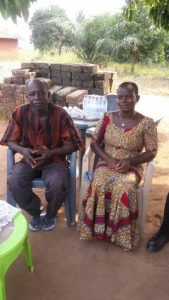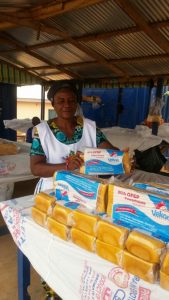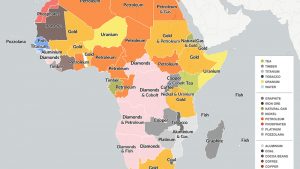
Julius Dorsese, 44, was thinking of hanging his boots from farming three years ago before he was persuaded by a local agric extension officer to try his hands on Orange-Fleshed Sweetpotato (OFSP) which is being piloted in Ghana, Nigeria, and Burkina Faso, all in West Africa.
Today, Mr Dorsese is a key sweetpotato seed multiplier and producer at Akatsi Abor in the Volta Region of Ghana. He has been growing planting material (vines) of the orange-fleshed sweetpotato since the commencement of the project in 2015.
Through the OFSP farming, he was able to reroof his house. While plans are underway to build a new compound house for his family, Mr Dorses revealed. While his children at the local basic school who used to attend school irregular due to their father’s inability to pay school fees, are now among the regular schoolchildren in the school, he told African Eye Report with a beaming smile.
“Poverty in the family is now a thing in the past. I thank God for using the OFSP to change the entire family’s lives. I am also grateful to the International Potato Center (CIP), the implementers of the project for coming to the aid of farmers in Ghana, Nigeria, and Burkina Faso”.
Mr Dorsese, however, used the opportunity to appeal to the implementers of the OFSP project and the government to provide him and other farmers with irrigation dams to ensure all-year-farming of the crop.
“I also need financial support to expand my 300 acres farm to 600 acres within the short possible time”, he stated.
His lovely wife, Mrs Dorsese who had just finished using the OFSP to prepare various delicacies at the time officials of the CIP, a root and tuber research-for-development institution, visited her husband and other farmers in the community, described the OFSP as “Godsend”.
She said: “Previously, it was hard for me to pay my weekly “susu” contributions. But since my husband started farming this sweetpotato (pointing at OFSP in a basin), I have never missed in paying my “susu” contributions”.
“Susu” is an informal way of collecting and saving money through a savings club or partnership. It is being practiced in Ghana and other parts of Africa.
“Now, I go to the village market regularly to sell my sweetpotapo pastries and sweetpotato roots to enable me raise money to complement the family’s income”. When asked how much does she make per market day, Mrs Dorsese said: “It depends on the nature of the market. When it is good, I can make about 200 Ghana cedis (about US$50) on that day but when it is not good I can make 100 Ghana cedis (about US$25) on that day”.
“Through the consumption of the OFSP meals, my husband and the children who used to complain about their eye problems but never visited the hospital, have never complained about any eye pain to me again”
Mr Dorsese, like other farmers in the Akatsi Abor as well as OFSP farmers in the country, sells some of his produce to consumers and retailers.
Besides, according to senior officials of the CIP, roughly half way through the last year of implementing the project, they are well on the way to achieving their vision: To demonstrate sustainable and inclusive market-driven approaches for OFSP that leads to increased incomes and improved health through consumption of vitamin A-rich OFSP, especially in women and children.
In Ghana, through the 2016 planting season, 54 Decentralised Vine Multipliers (DVMs) (110 vine producers and 76 groups of root producers (1,423 farmers, 32 percent women), were recorded.
The recently completed midline survey shows that 32 percent of sweetpotato fields in Ghana in target areas (Volta, Northern, Upper East, and Upper West regions) are covered by OFSP and more than 120,960 households benefited either directly or indirectly from OFSP across the three countries since the start of the project, the officials added.
In the dry and rainy season, production in the Northern Region of Ghana under the management of Association of Church-based Development Projects (ACDEP), 11 DVMs sold 812,430 OFSP vine cuttings: 268,400 cuttings (2,684 bundles) were bought by the ACDEP for its nutrition intervention; 157,200 cuttings (1,572 bundles) were sold through subsidised vouchers by the jumpstarting project within the Ghana Health Service (GHS) intervention to reach pregnant and lactating women, according to the project’s documents.
While 386,830 cuttings (3,868 bundles) were sold to farmers for cash.
“A total of 40,622 Ghana cedis (US$10,551) was generated as income for the DVMs. During the dry season production, eight small-scale producers (three women) and one large-scale producer (male) sold 8,015 kilograms of OFSP storage roots: 4,655 kg to retailers and consumers; 895 kg to two caterers for the Ghana School Feeding Programme ; and 2,465 kg to a wholesale buyer in Accra. They earned a total of 6,371 Ghana cedis (US$1,655)”.
Dr Erna Abidin, CIP Seed System Scientist and Project Manager for Jumpstarting OFSP in West Africa through Diversified Markets, added that in the Upper East Region, under the management of iDEG-Ghana, market demand analysis, bi-weekly radio discussions on malnutrition, production and availability were carried out.
She emphasised that partnership was established with seven processors. 315,600 cuttings (3,156 bundles) were sold by DVMs through a subsidised voucher scheme as part of the willingness to pay assessment at the GHS, generating 15,780 Ghana cedis (US$4,099).
In the GHS willingness to pay assessment, 4,728 pregnant women and lactating women received OFSP planting material through a voucher scheme. Each woman got a bundle of 100 cuttings and was encouraged to buy additional bundles, according to Dr Abidin who is based in Tamale in the Northern Region of Ghana.
“Furthermore, in the Ghana School Feeding Programme intervention, since 2016, 788 children from two schools in Kumbungu District, Northern Region have been receiving OFSP meals once a week.
A total of 895 kg of OFSP storage roots were supplied by commercial root producers to the programme, which will be expanded in the coming year”.
OFSP was recently introduced to the product line of Veron Bakery in Sogakope in the Volta Region, which employs than 200 people mostly women. Currently, the bakery buys 100 kg of OFSP roots from farmers daily.
The Manager at Vekon Bary, Delator Konu disclosed that the demand of the OFSP potato bread in Sogakope and its catchment areas is greater than expected. Because of the demand, we are almost finished building a new factory to produce the bread in large quantities, he told African Eye Report during a visit.
The Proprietor of Vekon Bakery, Madam Veronica Konu, said: “All the hotels, schools and individuals in the area patronise the OFSP bread daily”.

She told senior officials of the CIP who visited her factory during the visit that five bags of sweetpotato are mixed with any of the floor to bake the bread.
Madam Konu is envisioned to increase her daily production from 500 kilos to a tonne after the completion of the factory building which has hostel facility for the factory workers.
She added that the OFSP bread is more nutritious than any type of bread and therefore appealed to Ghanaians to consume the bread.
The Chairman of Ghana Sweetpotato Innovation Platform, Emmanuel Darkey who buys the newly developed OFSP from farmers in Ghana and sells to shopping malls in urban Ghana added that the economic and health benefits of the crop is too great to be enough.

Mr Darkey who also supplies the Vitamin-A dense Orange-Fleshed Sweetpotato (OFSP) to the U.S Embassy in Accra, and other market centres in the country stated: “Ghana can gain more foreign exchange from the OFSP than other mineral resources if attention is given to the crop”.
He said this during the field visit to the Volta region of Ghana on 7th February 2017, which showcased how the OFSP was finding its way into Ghanaians diets, generating income for thousands of smallholder farmers and private business owners in formal and informal markets.
It was revealed during the tour led by senior officials of the CIP,that, the OFSP is helping to combat hidden hunger amongst vulnerable populations.
It is also battling Vitamin A deficiency which is prevalent among children in Ghana. Vitamin A deficiency affects seven out of ten children in Ghana.
Mr Darkey stated: “Ghana can gain more foreign exchange from the OFSP than other mineral resources if attention is given to the crop”.
Mr Darkey noted: “The business aspect of the OFSP is too good. I have plans to export the product to Holland, and France soon”.
He was quick to add that the demand for the OFSP kind of sweetpotato is too great in Europe, and appealed to Ghanaian farmers to double the production of the crop.
Dr Ted Carey, CIP Regional Sweetpotato Breeder and Ghana Country Manager explained that the project implementers (CIP) have good working relationship with the Ministry of Food and Agriculture at national, regional and district levels in the country.
OFSP has the potential to improve the lives of millions of African households and its promise has been recognized on a global scale. In October 2016, three scientists-two from Africa— from the International Potato Centre were honored with the 2016 World Food Prize for their achievement in developing the single most successful example of micronutrient and vitamin biofortification.
Instructively, over the past 15 years, theCIP has helped build robust evidence to demonstrate that pro-vitamin A rich, Orange-fleshed Sweetpotato (OFSP) can combat vitamin A deficiency in children. CIP and its partners have shown that this new food is acceptable in traditional diets and that only one-half cup of OFSP provides the vitamin-A requirement for a single child.
Since 2009, CIP and its partners have delivered OFSP to nearly 260,000 households in Mozambique, Ethiopia, Malawi, Uganda, Angola, Kenya, and Rwanda. However, this is only the beginning and CIP is currently scaling up its research efforts and development impacts in Africa and Asia in an effort to reach 15 million households with orange-fleshed sweetpotato (OFSP) by 2020.
By Masahudu Ankiilu Kunateh, African Eye Report





